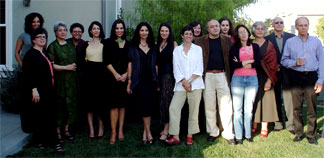به زبان فارسی
PICTORY
LATEST MUSIC
SEARCH
CORRESPONDENCE
19-Jun-2008
Among the millions of Iranian immigrants living outside of Iran today, there are many who have spent a good portion of their lives behind the bars of the Shah's or Khomeini's prisons. Now in exile, far from the coercive system of their home country, they have the opportunity to write about the time of their incarceration. Through this process they not only shed light on some corners of political life in contemporary Iran but also demonstrate that political prisoners, in spite of torture and fear of execution, are able to create a culture, of their own. In this culture like that of any other social group, we find joy and humor alongside depression and fear, as well as a passion for artistic and literary creativity which runs against the indoctrination policies of the repressive regimes>>>
MEN & WOMEN
18-Jun-2008 (7 comments)
The main theme of The Fish Fall In Love ("Mahiha ashegh mishavand" directed by Ali Rafii) is so familiar to the Iranian viewer that few of us may complain about its plot making no sense. Or if the viewer is not Iranian, he/she may adopt a post-modern disregard for plot logic and concentrate on the clearest message of the film: suspicion destroys our best hopes. Newly freed political prisoner, Aziz, (Reza Kianian) sneaks back to his Caspian hometown to find his fiancée, Atieh, has been married off. Philosophical about life, he sneaks back out to roam the planet doing we know not what. These events happen years before the movie begins
>>>
PERSEPOLIS
18-Jun-2008 (43 comments)
Marjane Satrapi's film, Persepolis must have made George Bush and his new ally, Nicolas Sarokzy, quite happy. After all, despite Satrapi's rhetoric against the two leaders, her film's core argument is one that Bush and Sarkozy have long been busy constructing: the evil state versus the wonderful people. Aesthetically, Persepolis is a refreshing and beautiful black-and-white animation, but it is also built on a black-and-white viewpoint of Iran. Satrapi's world is divided into two very separate groups: you are either with Marjane, in which case you'd are a nice, warm human being with properly drawn features; or you are against Marjane, and therefore either a black spectre with no human face features or an angry robot who represents the Iranian state>>>
LIFE
17-Jun-2008 (10 comments)
دوست جوانی از ایران برگشته است؛ او بی خبر دیشب آمده بود به محل کارم تا غافلگیرم کند. از دیدنش خوشحال و غافلگیر شدم و خلاصه اول از همه از "ایران" پرسیدم. از گرانی برنج حرفی نزد ولی با خوشحالی گفت: "خبر دارین که دیه زن و مرد برابر شد؟" لبم را گاز گرفتم که جوش نیاورم چون این دختر جوان از تولیدات پس از جمهوری اسلامی است. بیست و چند ساله است و جز جمهوری اسلامی چیزی به چشم ندیده، کودکی اش در سالهای سیاه جنگ بوده و در سالهای پس از جنگ، احتمالاً تازه نفس راحت و بی دغدغه ای کشیده اند و حالا هم با نگاهی مطابق با آن موازین دارد به مسایل می نگردد. "یواش یواش داره درست می شه" خیال جوش آوردن در برابر سنجاقک شکننده را نداشتم چون او مرا به سالهای پر شور خودم می اندازد و توی چشمانش چیزی است شبیه خواهرم مرجان. اینجا اسمش را می گذارم: "شاپرک"! >>>
IRAN
16-Jun-2008 (27 comments)
The Islamic Republic would actually welcome either of two misguided U.S. strategies — negotiations or war. Both strategies will strengthen their repressive control over Iran and will allow them to extend their strategic hegemony over much of the Middle East, into parts of Central Asia and the Indian Ocean region. The Islamic Republic has a long record of using negotiations as a tactic of buying time to further its illicit policies. Besides, official negotiation means officially recognizing the legitimacy of the other side — which is something the clerical regime has longed for. Official negotiations will also be interpreted as the U.S. government’s concession to the clerical regime. Do the prime supporters of global terrorism deserve rewarding?>>>
WRITERS
14-Jun-2008 (5 comments)
Over 60 Iranian American writers and members of the community have gathered to launch the Association of Iranian American Writers (AIAW) at a conference hosted by Professors Nasrin Rahimieh (UC Irvine) and Persis Karim (San Jose State University). Held at the University of California at Irvine and sponsored by the Dr. Samuel M. Jordan Center for Persian Studies and Culture, the event featured panels on topics ranging from fiction in the post-9/11 world to writing contemporary poetry to innovations in self-representation. With more Iranian Americans writing and publishing in English than ever before, the conference was an opportunity for dialogue about issues that are central to the development of what has become a formidable literary force in the US>>>
MUSIC
09-Jun-2008 (2 comments)
It was pretty natural for me to start drawing on my Persian heritage in the composition of my music. All artists establish a palette and a vocabulary for their work that is based on what they've heard and seen through their lives. I was born in NYC and grew up all around the East Coast with Iranian parents, so I heard Persian music, Persian poetry, alongside American music and poetry. It's been a pretty natural for me to draw on both cultures in my work. It feels more authentic to blend the two than to exclude one or the other in my work. >>>
MUSIC
05-Jun-2008 (10 comments)
Last weekend I met two (wonderful) 127 band members Sohrab Mohebbi and Salmak Khaledi at the home of BeyondPersia.com's Lalé Welsh and Amir Salamat near San Francisco. We listened to their entire new album "Khal Punk" and I was quite devastated by their musical range (mixing rock, rap, jazz, Iranian... ) and powerful lyrics. Their songs are addictive, and smart, and fun, and full of energy and lots and lots of plain truth. Ladies and gentleman, we have another super band! >>>
RECENT COMMENTS
IRANIANS OF THE DAY
| Person | About | Day |
|---|---|---|
| نسرین ستوده: زندانی روز | Dec 04 | |
| Saeed Malekpour: Prisoner of the day | Lawyer says death sentence suspended | Dec 03 |
| Majid Tavakoli: Prisoner of the day | Iterview with mother | Dec 02 |
| احسان نراقی: جامعه شناس و نویسنده ۱۳۰۵-۱۳۹۱ | Dec 02 | |
| Nasrin Sotoudeh: Prisoner of the day | 46 days on hunger strike | Dec 01 |
| Nasrin Sotoudeh: Graffiti | In Barcelona | Nov 30 |
| گوهر عشقی: مادر ستار بهشتی | Nov 30 | |
| Abdollah Momeni: Prisoner of the day | Activist denied leave and family visits for 1.5 years | Nov 30 |
| محمد کلالی: یکی از حمله کنندگان به سفارت ایران در برلین | Nov 29 | |
| Habibollah Golparipour: Prisoner of the day | Kurdish Activist on Death Row | Nov 28 |
















